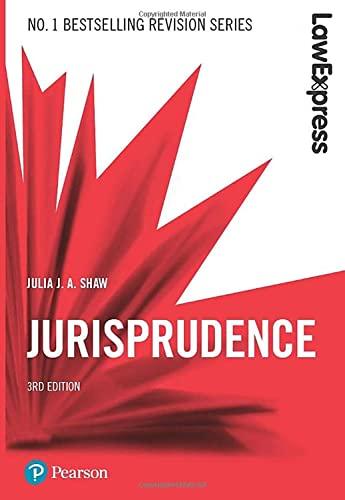Question
1. Conveyance or transfer of property,or a right, to another. 2. The voluntary relinquishment or abandonment--express or implied--of a legal right or advantage. 3. A
1. Conveyance or transfer of property,or a right, to another.
2. The voluntary relinquishment or abandonment--express or implied--of a legal right or advantage.
3. A person or entity not intended to benefit from a contract and thus one who does not acquire rights under the contract.
4. Court-ordered remedy requiring precise fulfillment of a legal or contractual obligation when monetary damages are inappropriate or inadequate.
5. The party to whom a duty is delegated.
6. Return or restoration of some specific thing or condition.
7. Principle requiring a plaintiff, after an injury or breach of contract, to use ordinary care to alleviate the effects of the injury or breach.
8. An amount contractually stipulated as a reasonable estimation of actual damages to be recovered by one party if the other party breaches.
9. The act of substituting for an old contract a new one that either replaces an existing obligation with a new obligation or replaces an original party with a new party.
10. The transfer of rights or property.
11. An unconditional offer of performance to satisfy a debt or obligation.
12. Protocol that says the first assignee has priority, aka the majority rule.
13. Doctrine that says if the entire performance of a contract becomes fundamentally changed without any fault by either party, the contract is considered terminated.
14. Act or event, other than a lapse of time, that must exist or occur before a duty to perform a promised performance arises.
15. A condition that must occur or be performed at the same time as another condition; the performance by each party being separately operative...
16. Foreseeable loss that results from a party's breach of contract. (Also referred to as special ________.)
17. Rejection of a contractual duty before the time for performance, giving the injured party an immediate right to damages.
18. Violation of a contactual obligation, either by failing to perform or by interfering with the other party's performance.
19. The occurrence of a contingency whose nonoccurrence was an assumption in the contract, as a result of which one party cannot perform.
20. Expenses that are caused directly by a breach of contract, such as those incurred to obtain performance from another source.
A. Alienation
B. Delegatee
C. Incidental beneficiary
D. Assignment
E. American Rule
F. Anticipatory repudiation
G. Breach of contract
H. Commercial impracticability
I. Concurrent conditions
J. Condition precedent
K. Frustration of purpose
L. Novation
M. Tender
N. Consequential damages
O. Incidental damages
P. Liquidated damages
Q. Mitigation of damages
R. Restitution
S. Specific Performance
T. Waiver
Please match the statements (definitions or descriptions) with the correct vocabulary term.
Step by Step Solution
There are 3 Steps involved in it
Step: 1

Get Instant Access to Expert-Tailored Solutions
See step-by-step solutions with expert insights and AI powered tools for academic success
Step: 2

Step: 3

Ace Your Homework with AI
Get the answers you need in no time with our AI-driven, step-by-step assistance
Get Started


